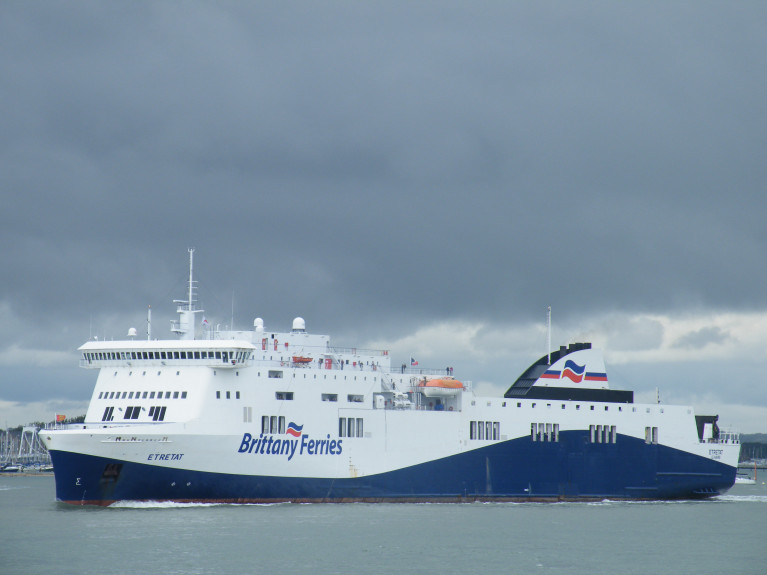Operator Brittany Ferries this week announced plans to increase services out of two Irish ports in 2021 but the new developments may lead to further consequences for the ferry firm given fluidity of Brexit, Covid-19 and economies impacting ferry holiday-makers and freight, writes Jehan Ashmore.
As a second Cork-Roscoff cruiseferry move which Afloat highlighted last weekend was followed by further plans for a new Ireland-France route published on mainstream media, demonstrated the company’s long-term commitment to Ireland. According to Brittany Ferries this in despite of on-going uncertainty over (Covid-19) travel restrictions and quarantine requirements this season, and the effect this is having on service viability.
- New Rosslare – Cherbourg route to open (in 2021) Afloat confirms to begin on 22nd March (using the Irish Rail operated 'Europort')
- connecting Cherbourg which is in response to demand from Irish and continental hauliers
- Additional mid-week sailing added to Cork – Roscoff 'seasonal' service (also 2021) Afloat also confirmed to be 24th March
In 2021, as alluded above a totally new route Rosslare-Cherbourg connection is to be added to the Rosslare-Bilbao sailings (from the Wexford port) which commenced earlier this year. In addition according to Brittany Ferries there is further good news for the Port of Cork with the addition of an extra mid-week sailing from Cork – Roscoff. The development Afloat adds follows the closure earlier this year of the first Ireland-Spain direct route of Cork-Santander only launched in 2018.
The new sailings Brittany Ferries adds will see the utilisation of Connemara* (a ropax for Rosslare) and the Armorique (cruiseferry for Cork). The Amorique will join the flagship Pont-Aven which (like today) continues to serve the main Cork – Roscoff sailings at weekends.
Afloat however consulted the website sailing schedule to discover no-frillls (économie) branded ferry, Etretat* is rostered instead of Connemara deployed on the Rosslare-Cherbourg route. So Afloat awaits a reply from Brittany Ferries for the change of ropax which had served Rosslare before and for the former Celtic Link Ferries. In addition the Etretat is rostered to take over Kerry from November on the Rosslare-Bilbao crossing that covers both the Celtic Sea and Bay of Biscay.
The announcement of developments on Thursday comes on the day the company launched its schedules for 2021 sailings connecting the UK & Ireland with Spain. Reservations for all 2021 routes are now open. Passenger reservations can now be made for services up to the end of (October next year) on the following routes:
Rosslare – Bilbao
Cork – Roscoff
Rosslare – Cherbourg
The new Rosslare-Cherbourg connection promises more choice and greater capacity on ferries linking Ireland and France.
Earlier this year, Brittany Ferries opened a new Ireland-Spain service, Rosslare-Bilbao and (more recently the 'seasonal' Rosslare-Roscoff) operated by another no-frillls / économie branded ferry, Kerry. This ropax took over from Connemara on the original operators Cork-Santander service which was withdrawn earlier this year.
Primarily for freight, the twice-weekly Spanish rotations proved popular. However Irish and French hauliers have asked Brittany Ferries to move the weekly French rotation from Roscoff to the transport hub of Cherbourg.
Afloat requested a response from the ferry operator as to why no sailings are advertised for bookings on the Rosslare-Roscoff route in 2021, however no reply was forthcoming. In the meantime this 'holiday' route is the second shortest sea duration route connecting Ireland and mainland Europe and is so far available to book at least until late October.
Brittany Ferries has agreed to the hauliers request and confirmed that Connemara (despite ferry website's schedule of Etretat) to operate as a 'no-frills' branded service and which will serve two weekly Rosslare-Bilbao rotations, as well as a single Rosslare-Cherbourg rotation as of March next near.
It would appear that freight is 'king' in this regard to the priority of French port use and likewise the decision by Brittany Ferries to abandon the Cork-Santander link in favour of haulier demands then to relocate both Ireland-Spain ports to the current Rosslare-Bilbao route.
There is however good news for the Cork-Roscoff route too cited Brittany Ferries. As primarily the service serves the tourist market with a near 50-50 split of Irish and French holiday-makers. These travellers will now benefit from an additional weekly rotation between the two ports, thanks to the introduction of the operator's aformentioned Armorique.
Roscoff-Cork weekend sailings will remain served by flagship Pont-Aven and with this new rotation by the Armorique during the week, significantly increasing capacity out of and into Cork. It will open more choice for those seeking a shorter break in either Ireland or France, with options to leave and return with Brittany Ferries, either mid-week or at the weekend.
Armorique will also continue in 2021 to maintain Roscoff-Plymouth service from where the cruiseferry custom-built for the western-most English Channel route made a maiden debut in 2008. Since then the cruiseferry has covered in for fleetmates on other routes among them Cork-Roscoff last year and previously reported on Afloat on the Caen (Oustreham)-Portsmouth route.































































